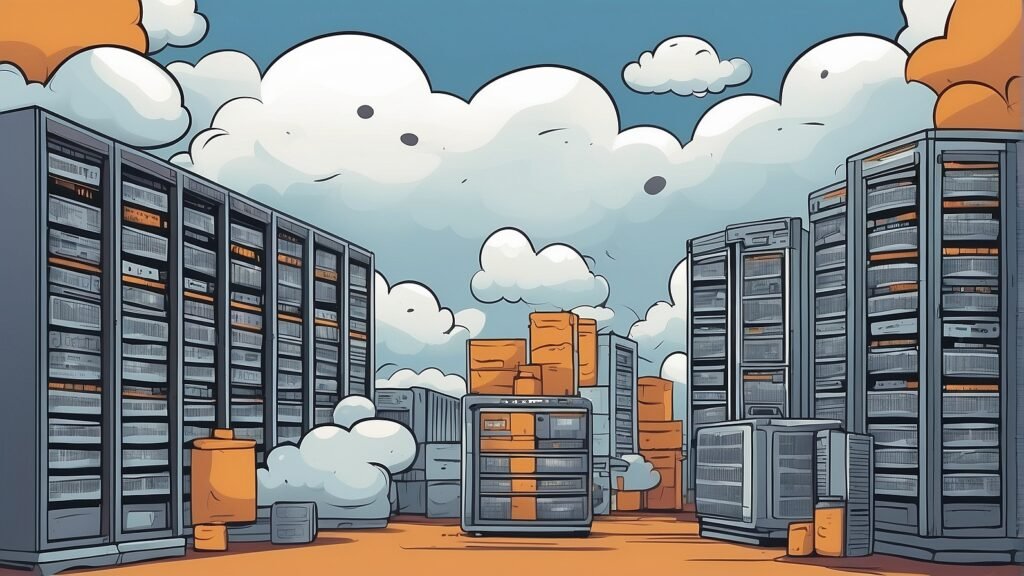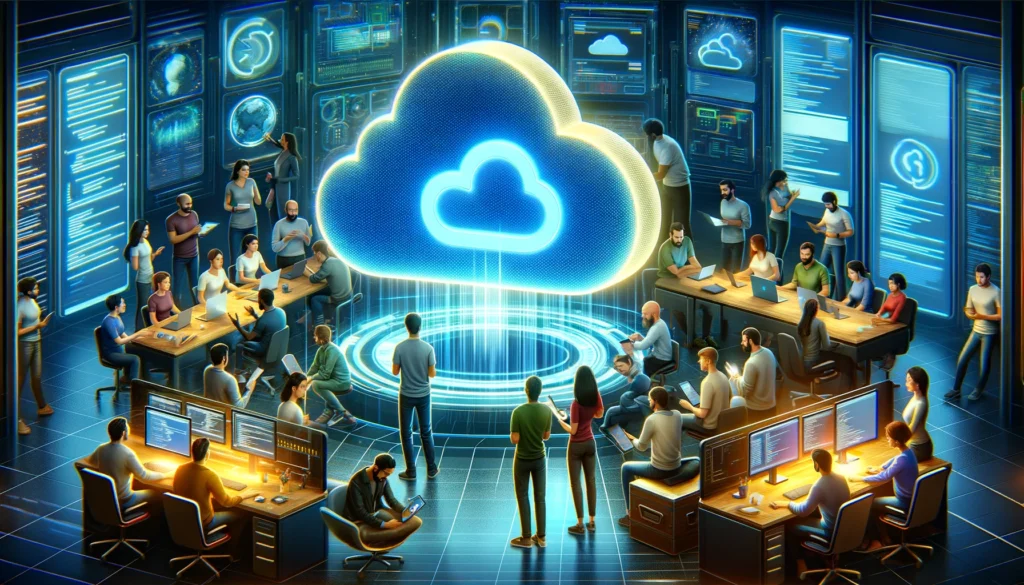Key Takeaways
- Understanding Google Cloud’s vast services for developers
- Leveraging Google Cloud for enhanced coding productivity
- Strategies for cost-effective use of Google Cloud resources
- Best practices for security and compliance in Google Cloud
- Integrating Google Cloud with existing development workflows

Google Cloud Platform (GCP) offers a comprehensive suite of cloud computing services that can significantly enhance the capabilities of developers, particularly in a remote work environment.
With its wide array of tools and services, GCP provides resources that cater to various aspects of coding and application development, making it a valuable asset for developers looking to harness the power of cloud computing.
The Landscape of Google Cloud: A Developer’s Playground
Google Cloud Platform (GCP) stands out as a robust cloud service provider, offering an extensive range of services that cater to diverse development needs. From compute engines to AI and machine learning tools, GCP equips developers with the necessary resources to build, test, and deploy applications efficiently.
Understanding the landscape of GCP is crucial for developers to effectively utilize its capabilities. This includes familiarity with key services like Compute Engine, App Engine, Cloud Functions, and Kubernetes Engine, each offering unique advantages for different project requirements.
Key Services and Their Use Cases
GCP’s versatility lies in its range of services. Compute Engine provides scalable, high-performance virtual machines, ideal for demanding computational tasks. App Engine simplifies application deployment, allowing developers to focus on coding without worrying about the underlying infrastructure.
Cloud Functions offers a serverless execution environment for event-driven applications, enabling automatic scaling and minimal operational management. Kubernetes Engine, on the other hand, facilitates containerized application management, making it a go-to for developers adopting microservices architecture.
Navigating the GCP Interface
A crucial aspect of harnessing GCP’s power is navigating its interface efficiently. The GCP Console, a web-based interface, offers a user-friendly dashboard for managing services.
Understanding the layout, learning how to navigate through different service sections, and using the Cloud Shell for command-line operations are fundamental skills for developers.
The console also provides quick access to project resources, billing information, and documentation, making it a central hub for all GCP-related activities.
Enhancing Coding Productivity with GCP
Google Cloud’s array of tools not only supports but enhances coding productivity. Its integrated development environments (IDEs), source code repositories, and continuous integration/continuous deployment (CI/CD) tools streamline the development process. These tools enable developers to write, test, and deploy code more efficiently, which is particularly beneficial for remote teams working on collaborative projects.
Streamlining Development with Cloud-Based IDEs
Cloud-based IDEs like Cloud Shell and Cloud Code provide a seamless development environment accessible from anywhere. These IDEs offer features like code completion, debugging tools, and direct integration with other GCP services. They allow developers to write and test code in a cloud-native environment, reducing the need for local setup and ensuring consistency across development teams.
Leveraging CI/CD for Efficient Deployment
GCP’s CI/CD tools, such as Cloud Build and Spinnaker, automate the code deployment process, ensuring quick and reliable delivery of applications. These tools integrate seamlessly with source code repositories like Cloud Source Repositories or GitHub, enabling automated testing and deployment pipelines. By automating these processes, developers can reduce manual errors and focus on coding and innovation.
Cost-Management Strategies in Google Cloud
While Google Cloud offers extensive resources, managing costs effectively is a critical aspect for developers and organizations. GCP provides tools and features to monitor and control spending, ensuring that cloud resources are utilized efficiently without unnecessary expenses.
Understanding Billing and Usage Reports
GCP’s detailed billing and usage reports offer insights into resource consumption, helping developers identify areas where costs can be optimized. These reports break down expenses by service, project, and even specific resources, providing a granular view of cloud spending.
Implementing Cost-Effective Practices
Implementing cost-effective practices involves choosing the right services and configurations for specific needs. This includes selecting appropriate machine types, using preemptible VMs for non-critical workloads, and leveraging sustained use discounts. Additionally, setting up budget alerts and using the Cost Management tool can prevent unexpected overages.
Security and Compliance in Google Cloud
Ensuring security and compliance is paramount when working with cloud services. GCP offers robust security features and compliance certifications, making it a reliable platform for sensitive and regulated workloads.
Leveraging Built-in Security Features
GCP’s built-in security features include identity and access management (IAM), encryption at rest and in transit, and network security controls. Understanding and implementing these features effectively can safeguard applications and data against unauthorized access and threats.
Navigating Compliance in the Cloud
For industries with specific regulatory requirements, GCP provides compliance resources and certifications, such as GDPR, HIPAA, and ISO. Familiarizing oneself with these resources and integrating compliance checks into the development process ensures that applications meet industry standards and regulatory requirements.

Integrating Google
Cloud with Existing Workflows
Integrating GCP with existing development workflows can enhance efficiency and leverage cloud capabilities to their fullest. This involves understanding how GCP’s services can complement and augment current practices, from coding to deployment.
Seamless Integration with Development Tools
GCP’s compatibility with popular development tools and platforms enables a smooth transition to the cloud. Integrating GCP services with existing version control systems, IDEs, and deployment tools allows developers to maintain their familiar workflows while benefiting from cloud scalability and flexibility.
Adopting a Hybrid or Multi-cloud Approach
For organizations not fully committed to a single cloud provider, GCP supports hybrid and multi-cloud architectures. This flexibility allows developers to leverage the best of GCP while maintaining other cloud or on-premises resources, offering a balanced approach to cloud computing.
Leveraging Google Cloud AI and Machine Learning Services
Google Cloud’s AI and Machine Learning services open a realm of possibilities for developers, enabling them to build more intelligent and responsive applications. These services range from pre-trained APIs to customizable machine learning models, catering to both novice and experienced AI practitioners.
Utilizing Pre-Trained AI APIs
GCP offers a suite of pre-trained AI APIs, including Vision AI, Natural Language API, and Speech-to-Text, which developers can integrate into their applications without deep machine learning expertise. These APIs enable applications to see, understand, and interpret the world, adding significant value to user experiences.
Building Custom Models with AutoML and AI Platform
For more customized needs, Google Cloud’s AutoML and AI Platform provide tools to train, deploy, and manage machine learning models. AutoML allows developers with limited machine learning expertise to train high-quality models, while the AI Platform caters to experienced users offering end-to-end machine learning workflow support.
Google Cloud’s Data Management and Analytics Tools
Data is the cornerstone of any application, and Google Cloud provides a robust set of tools for efficient data management and analytics. These tools help developers store, process, and analyze large volumes of data, gaining insights to inform better decision-making and application improvement.
Big Data Processing with BigQuery and Dataflow
BigQuery, a fully-managed data warehouse, enables fast SQL queries across terabytes of data, while Dataflow provides stream and batch data processing capabilities. Leveraging these tools, developers can handle massive datasets with ease, ensuring that data-driven decisions are always based on the latest information.
Data Storage Solutions
GCP offers a variety of storage solutions, including Cloud SQL for relational databases, Firestore for NoSQL database needs, and Cloud Storage for object storage. Choosing the right storage solution based on the application’s data type and access patterns is crucial for optimizing performance and cost.

Enhancing Developer Collaboration with Google Workspace
Google Workspace, formerly G Suite, offers a suite of collaboration tools that integrate seamlessly with Google Cloud, enhancing team productivity and communication. These tools, including Gmail, Docs, Sheets, and Meet, are especially beneficial for remote development teams, enabling real-time collaboration and efficient project management.
Real-time Collaboration and Project Management
Using Google Workspace tools, development teams can collaborate on code, documentation, and project plans in real-time, regardless of their geographical location. Features like shared drives, document versioning, and comments facilitate a collaborative environment that speeds up the development process.
Integration with Google Cloud Services
Workspace tools integrate with various GCP services, providing a unified platform for development and collaboration. For instance, developers can access GCP resources directly from Google Drive, or use Google Meet for team meetings with easy access to GCP project data.
Optimizing Applications with Google Cloud’s Networking Services
Google Cloud’s global networking infrastructure ensures high performance and availability for applications. Understanding and utilizing GCP’s networking services can significantly improve application response times and reliability.
Leveraging Global Load Balancing and CDN
Google Cloud’s global load balancing and Content Delivery Network (CDN) ensure that user requests are served by the nearest data center, reducing latency and enhancing user experience. Implementing these services is key for developers aiming to build highly available, globally accessible applications.
Network Security and Optimization
In addition to performance, GCP provides robust network security features, including Virtual Private Cloud (VPC), firewalls, and Identity-Aware Proxy. These tools help secure application data while optimizing network performance, crucial for maintaining user trust and compliance with security standards.
Future-Proofing Development with Google Cloud’s Sustainability Initiatives
Google Cloud is committed to sustainability, offering a cloud infrastructure that is environmentally conscious. Developers and organizations increasingly consider the environmental impact of their technology choices, making GCP an attractive option for sustainable development practices.
Carbon-Neutral Cloud Infrastructure
GCP’s data centers are designed to be highly energy-efficient and use renewable energy sources, ensuring a lower carbon footprint for cloud operations. By choosing GCP, developers contribute to more sustainable technology practices.
Tools for Measuring and Reducing Environmental Impact
Google Cloud provides tools and insights to help organizations measure and reduce their environmental impact. These tools enable developers to make informed decisions about resource utilization, aligning with broader sustainability goals.
Streamlining Development with Google Cloud’s DevOps Solutions
Google Cloud’s DevOps solutions provide an ecosystem for efficient software development and operations, enhancing collaboration and automation. These tools facilitate continuous integration and delivery, monitoring, and management, essential for high-performing development teams.
Continuous Integration and Delivery with Cloud Build
Cloud Build streamlines the process of building, testing, and deploying applications. It automates the pipeline, allowing developers to quickly move code from development to production while ensuring quality and consistency.
Monitoring and Logging with Stackdriver
Stackdriver offers comprehensive monitoring, logging, and diagnostics. It provides insights into application performance and health, enabling developers to detect and resolve issues rapidly, ensuring high availability and reliability.

Google Cloud’s Edge Computing Capabilities
Edge computing is crucial for applications requiring low latency and high responsiveness. Google Cloud’s edge computing solutions extend its infrastructure to the edge, closer to users, optimizing performance for critical applications.
Leveraging Edge Locations
With a network of edge locations, GCP enables developers to deploy applications closer to users. This reduces latency, improves response times, and enhances user experience, particularly for content delivery and IoT applications.
Integrating IoT with Cloud IoT Core
Cloud IoT Core allows developers to securely connect and manage IoT devices at scale. By integrating IoT devices with GCP’s powerful data analytics and machine learning capabilities, developers can extract meaningful insights from IoT data.
Scaling Applications with Google Cloud’s Elastic Resources
One of the key advantages of Google Cloud is its ability to scale resources to match application demands dynamically. This elasticity ensures optimal performance and cost-effectiveness, catering to varying user loads.
Auto-Scaling Compute Resources
GCP’s auto-scaling capabilities automatically adjust compute resources based on demand. This ensures that applications have the necessary resources during peak times while minimizing costs during low usage periods.
Managing Resources with Kubernetes Engine
Kubernetes Engine simplifies the deployment, scaling, and management of containerized applications. It automates container orchestration, enabling developers to focus on building applications rather than managing infrastructure.
Building Serverless Applications on Google Cloud
Serverless computing allows developers to build and run applications without managing servers. Google Cloud’s serverless offerings, like Cloud Functions and App Engine, enable developers to focus on code, accelerating development and innovation.
Advantages of Going Serverless
Serverless architecture offers several benefits, including reduced operational overhead, automatic scaling, and a pay-as-you-go pricing model. This approach allows developers to launch applications quickly and efficiently, with minimal infrastructure management.
Use Cases for Cloud Functions and App Engine
Cloud Functions is ideal for event-driven applications and microservices, responding to events from GCP services or HTTP requests. App Engine, on the other hand, is suitable for web applications and APIs, providing a fully managed platform with built-in services and integrations.
Enhancing Mobile Application Development with Firebase
Firebase, integrated with Google Cloud, offers a suite of tools for building and improving mobile applications. It provides capabilities for development, analytics, authentication, and database management, simplifying the mobile development process.
Streamlining Mobile App Development
Firebase simplifies many aspects of mobile app development, from real-time databases and user authentication to hosting and cloud storage. These tools reduce development time and complexity, allowing developers to focus on creating engaging mobile experiences.
Analytics and User Engagement with Firebase
Firebase Analytics offers deep insights into user behavior, helping developers understand how users interact with their applications. Combined with features like Cloud Messaging and Remote Config, developers can enhance user engagement and retention.

Advanced Data Management with Google Cloud’s Bigtable and Spanner
Google Cloud’s Bigtable and Spanner represent the forefront of scalable, high-performance data management solutions, catering to large-scale, mission-critical applications.
Utilizing Bigtable for High-Throughput Data Needs
Cloud Bigtable offers a NoSQL database service designed for applications that require very high throughput and scalability, such as ad tech, financial analytics, and IoT. It excels in handling large volumes of data with low-latency read/write operations.
Embracing Global Consistency with Cloud Spanner
Cloud Spanner combines the benefits of relational database structure with non-relational horizontal scale. This fully managed, globally-distributed database is ideal for applications that require strong consistency, high availability, and global scale.
Google Cloud’s Commitment to Open Source and Community
Google Cloud actively contributes to and supports open-source communities, recognizing the importance of open-source software in modern technology development.
Integrating Open Source Technologies
GCP integrates with a wide range of open-source technologies, offering developers the flexibility to use their preferred tools and frameworks. This includes support for technologies like Kubernetes, TensorFlow, and Apache Beam.
Fostering the Open Source Community
Google Cloud contributes to the open-source community by releasing its own innovations as open-source projects and supporting various open-source initiatives. This commitment fosters innovation and collaboration within the developer community.
Customizing Applications with Google Cloud’s APIs and SDKs
Google Cloud’s APIs and SDKs enable developers to customize and extend the functionality of their applications, integrating seamlessly with GCP’s vast array of services.
Extensive Range of APIs for Enhanced Functionality
GCP offers a comprehensive set of APIs covering various services, from computing and storage to machine learning and analytics. These APIs allow developers to integrate these services into their applications, enhancing functionality and performance.
SDKs for Simplified Cloud Interaction
Google Cloud SDKs, available in multiple programming languages, simplify the interaction with GCP services. They provide libraries and tools that streamline authentication, service requests, and response handling, making cloud development more efficient.
Building Immersive Experiences with Google Cloud’s AR and VR Services
Google Cloud is at the forefront of augmented reality (AR) and virtual reality (VR) technologies, providing developers with tools to create immersive and interactive experiences.
Leveraging AR and VR for Innovative Applications
Developers can use Google Cloud’s AR and VR services to build innovative applications in gaming, education, and enterprise training. These technologies offer new ways to engage users, providing unique, immersive experiences.
Integrating with Google’s ARCore and Poly
Google’s ARCore allows for building AR experiences that seamlessly blend digital content with the physical world. Poly, Google’s 3D object platform, provides a wealth of 3D assets for developers to use in AR and VR applications.

Nurturing Developer Skills with Google Cloud’s Training and Certification Programs
Google Cloud not only provides a platform for development but also offers extensive training and certification programs to help developers enhance their cloud skills.
Comprehensive Training Resources
Google Cloud’s training resources, including online courses, hands-on labs, and documentation, cater to different skill levels and learning preferences. These resources help developers stay updated with the latest cloud technologies and best practices.
Certification for Professional Development
Google Cloud certifications validate professional expertise in various cloud domains. These certifications, such as Professional Cloud Architect or Data Engineer, are valuable for career growth, demonstrating a developer’s proficiency in using GCP to prospective employers.
Conclusion
In conclusion, Google Cloud offers an expansive and versatile platform that caters to a wide array of development needs.
From advanced data management and integration of open-source technologies to the creation of immersive AR and VR experiences, Google Cloud provides the tools and resources necessary for modern, efficient, and innovative application development.
Its commitment to sustainability, support for open-source communities, and extensive training and certification programs further establish it as a forward-thinking and developer-friendly cloud platform.
For developers in remote work environments, Google Cloud stands as a beacon of productivity, collaboration, and technological advancement, offering solutions that are both cutting-edge and practical.
Useful Table: Google Cloud Services Overview
| Service Category | Key Services | Primary Use Cases | Benefits |
|---|---|---|---|
| Compute | Compute Engine, Kubernetes Engine, App Engine, Cloud Functions | Application hosting, container orchestration, serverless computing | Scalability, flexibility, and efficiency in application deployment |
| Storage | Cloud Storage, Cloud SQL, Firestore | Object storage, relational and NoSQL databases | Reliable and scalable storage solutions for diverse data needs |
| AI & Machine Learning | AI Platform, AutoML, Vision AI, Natural Language API | Building AI models, integrating machine learning into applications | Access to advanced AI capabilities with ease of use |
| Data Analytics | BigQuery, Dataflow, Dataproc, Looker | Big data processing, business intelligence | Fast, scalable analytics and actionable insights |
| Networking | Virtual Private Cloud, Cloud Load Balancing, Cloud CDN | Network management, content delivery | Enhanced performance and security for global applications |
| DevOps | Cloud Build, Stackdriver, Container Registry | Continuous integration and deployment, monitoring | Streamlined development lifecycle and improved application reliability |
| AR & VR | ARCore, Poly | Augmented and virtual reality experiences | Creating immersive and interactive user experiences |
| Training & Certification | Qwiklabs, Coursera, Google Cloud certifications | Skill development and professional growth | Enhancing cloud expertise and credentials for career advancement |
Frequently Asked Questions
What is Google Cloud Platform and How Does it Benefit Developers?
Google Cloud Platform (GCP) is a suite of cloud computing services offered by Google. It provides developers with scalable and flexible computing resources, powerful data analytics tools, and innovative machine learning capabilities. GCP benefits developers by reducing infrastructure management overhead, offering advanced technologies, and supporting rapid development and deployment.
How Does Google Cloud Support Serverless Computing?
Google Cloud supports serverless computing through services like Cloud Functions and App Engine. These services allow developers to run code without managing servers, automatically scaling based on demand. Serverless computing simplifies deployment, reduces costs, and improves efficiency in managing applications.
Can Google Cloud be Integrated with Open Source Technologies?
Yes, Google Cloud can be seamlessly integrated with a wide range of open-source technologies. GCP supports Kubernetes for container orchestration, TensorFlow for machine learning, and Apache Beam for data processing, among others. This integration enables developers to use their preferred tools and frameworks within the Google Cloud environment.
What are the Security Features of Google Cloud?
Google Cloud offers robust security features including identity and access management (IAM), encryption at rest and in transit, network security controls, and compliance certifications. These features ensure that applications and data on GCP are secure from unauthorized access and threats.
How Does Google Cloud Facilitate Collaboration Among Remote Development Teams?
Google Cloud facilitates collaboration among remote development teams through its integration with Google Workspace. Tools like Gmail, Docs, Sheets, and Meet enable real-time collaboration on code, documentation, and project management, enhancing productivity and communication for geographically dispersed teams.
What Training and Certification Opportunities Does Google Cloud Offer?
Google Cloud offers comprehensive training resources, including online courses, hands-on labs, and documentation, catering to different skill levels. Additionally, it provides various certifications, like Professional Cloud Architect or Data Engineer, validating a developer’s expertise in using GCP.
How Does Google Cloud Promote Sustainable Development Practices?
Google Cloud promotes sustainable development practices by operating energy-efficient data centers powered by renewable energy. It provides tools for measuring and reducing the environmental impact, aligning with sustainable technology practices and reducing the carbon footprint of cloud operations.
Can Google Cloud Handle Large-Scale Data Management and Analytics?
Yes, Google Cloud is well-equipped to handle large-scale data management and analytics. Services like BigQuery for data warehousing and Dataflow for stream and batch processing enable handling of massive datasets, facilitating fast and scalable data analytics.
In summary, Google Cloud empowers developers with a wide range of services, from computing and storage to advanced AI and machine learning, all under a secure and sustainable cloud infrastructure. Its robust offerings and commitment to innovation make it an essential tool for developers seeking to build cutting-edge, scalable, and efficient applications.